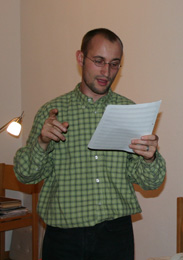
We both have got very little time and that is why we are sitting outside the cafeteria enjoying the last (?) warm day of October. I am asking questions and writing while Michael is answering and munching the delicious lunch made by Roger.
Enjoy your meal. Sorry, we need to do this in English, I know we’re both German. It’s kind of odd, but we can switch back and forth. So tell me please, how long have you been working for ECLA?
Since January 2006.
Were there more singers last term?
No, not really, numbers vary between 7 and 10, but at the end of last term, people dropped out because there was so much work to do.
That’s a shame. Not even having time for singing. You are also conducting another choir. What is that like? Different?
I’m conducting choirs in church with a size of 35-45 singers. It’s different because of the repertoire and there is much more pressure. We have concerts and need to get the program ready for that. It is not as playful as in ECLA choir where we walk around singing “Goodnight, goodnight” in the dark. In church, we have real rehearsals.
“Real rehearsals.” Sounds serious.
I take both seriously.
Is the lack of male voices a common problem?
Oh yes, very wide-spread. Especially tenors.
Nevertheless, I heard Germany has got more choirs in relation to its size than any other country. By the way, are you a tenor or a bass?
Neither nor, I’m a lyrical baritone.
Please explain.
There are different sorts of baritone voices. Basically, a baritone is a medium voice between tenor and bass.
That’ll do, thanks. Do you play another instrument? – Well, stupid question, of course you do.
I play the piano and the organ, as I got a degree in church music. I don’t like playing the organ in services, though. I also used to play the violin and the trombone, but now I have got no more time to practise. I’m still studying voice at the university.
Which one is your favourite?
Voice, actually. I personally think the voice allows more self-expression than any other instrument. And I have been singing for a very long time and my first musical experiences were with singing.
Since your childhood?
Yes, my grandma was a singer.
You have a certain way of teaching voice. You classify people into different breathing types. Could you explain your theory?
It goes back to Erich Wilk, a doctor and musician who during World War 2 discovered that some people feel more comfortable with breathing in and lying on their back whereas some prefer breathing out and lying and prefer the stomach position.
There are areas of expansion and areas of compression in your body and you need to get them right to use your full energy. Your breathing type also depends on the gravitational influence of the moon on the earth the minute where you are born. Later, people drew more connections between medicine and music and it is quite wide-spread today.
I’m sceptical. It sounds very esoteric.
Well, I use it for my lessons and if people feel they are improving their voice, why not?
Yes, sure. One last question: Is it painful for you to hear a bad note or an unclear chord?
It can be, yes. Usually no, but some arrogant singers who consider themselves as outstanding musicians while they don’t realize that they are wrong can make me aggressive.
But as soon as everyone tries his best, I’m fine. We will work on the intonation in the ECLA choir.
I’m sure we will. I’ve got to run now, thanks a lot and enjoy the rest of your mashed potatoes. See you.
By Judith Schmid (AY 2007, Germany)
